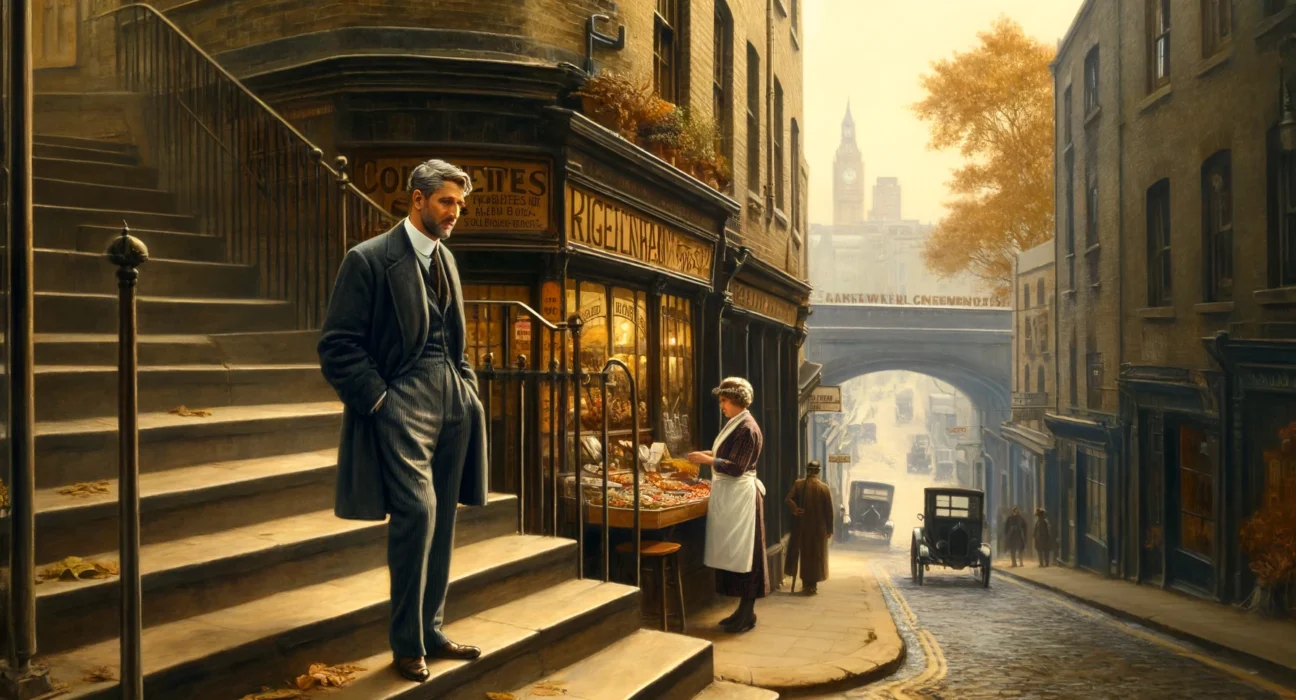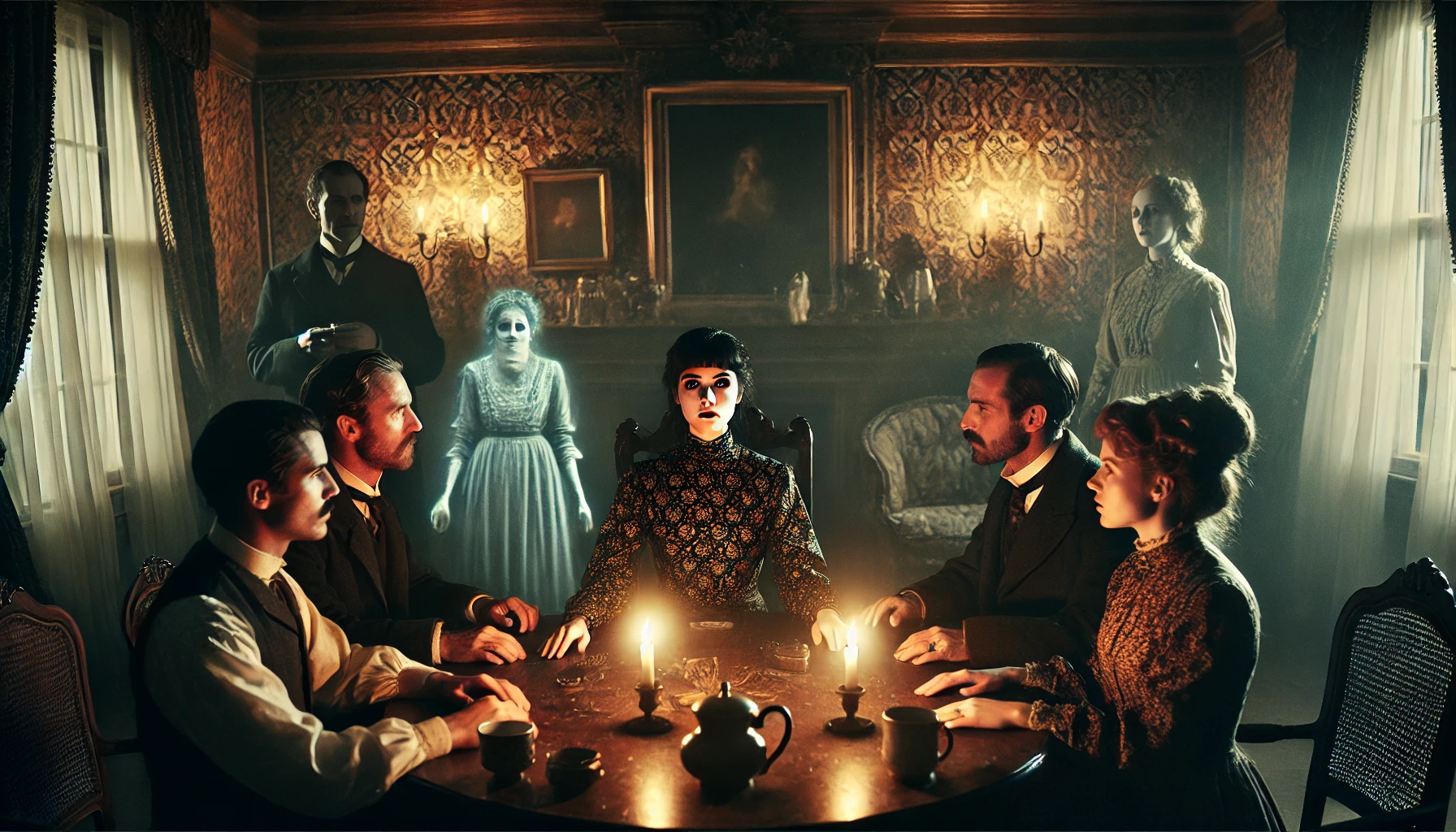“Riceyman Steps,” written by Arnold Bennett and published in 1923, is a nuanced exploration of post-World War I life in the Clerkenwell area of London. The novel won the James Tait Black Memorial Prize, capturing the everyday struggles, obsessions, and interactions of its characters in a gritty urban setting. Bennett’s precise, realist style paints a vivid picture of human behavior, delving into themes of isolation, greed, and the often suffocating nature of routines and relationships.
Plot Summary
On a damp autumn afternoon in 1919, Henry Earlforward ascends Riceyman Steps, a flight of stone stairs in Clerkenwell, London. His bookshop, tucked away at the base of these steps, is cluttered and quiet, much like Henry himself. A man in his middle age, Henry has lived alone for years, cultivating a life of strict frugality. His routines are his comfort—he hoards money obsessively and avoids indulgence, content in his isolation. The noise of the outside world and the bustling life of London feel distant to him, shut out by the dusty walls of his shop.
Across the street, Violet Arb has recently taken over a small confectionery shop. A widow in her forties, Violet is looking for a new beginning after her husband’s death. The war has left her unsettled, yearning for purpose. She is drawn to Henry, sensing a shared loneliness beneath his reserved demeanor. Her lively spirit contrasts sharply with Henry’s miserly habits, but something stirs between them. As they begin to spend more time together, they contemplate marriage, each imagining that companionship might ease their loneliness.
For Henry, marriage represents not just emotional fulfillment but also a kind of practicality. His solitary existence, which once seemed enough, now appears fragile. Violet offers him a way to strengthen his routine, to introduce a new kind of order. He imagines her presence bringing warmth to his cold, cluttered rooms. Yet, even as he moves toward this change, Henry remains consumed by his obsession with saving money. He is miserly to the point of self-neglect, refusing to spend on comforts, clinging to every penny as if it were his life’s purpose.
Violet, on the other hand, sees marriage as an escape from the staleness of her shop and her memories of widowhood. She is eager for new possibilities and hopes to create a future with Henry that is less constrained by the sorrows of the past. Still, she cannot fully grasp the depths of Henry’s stinginess and the extent to which it controls his life. She underestimates how much his rigid habits will dictate their shared life together.
Among these lives, Elsie, the charwoman who works for both Henry and Violet, moves silently. She scrubs their floors, dusts their shelves, and witnesses the delicate dance of their courtship. Elsie is young and poor, a widow like Violet, though her circumstances are much more dire. She lost her husband early in the war and now spends her days cleaning houses, her future uncertain. Her brief marriage is a fading memory, and she clings to the small joys of daily life. Yet, despite her hard circumstances, there is resilience in her. She is a silent witness to the lives of those around her, playing her part in their worlds while carrying her own unspoken burdens.
Henry and Violet’s marriage, when it comes, is marked not by celebration but by compromise. They settle into a new life together, though it soon becomes clear that their hopes for companionship clash with the realities of Henry’s unyielding nature. Violet attempts to bring some warmth into their household, but Henry’s obsession with money and control over their expenses slowly erodes the relationship. He refuses to buy necessities, scrimping even on heating and food. Violet, increasingly frustrated, finds herself ensnared in a life that is not much different from her lonely widowhood, only now she must contend with Henry’s oppressive need to save every farthing.
As winter sets in, their home grows colder, both in temperature and in spirit. Henry’s health begins to falter. His refusal to spend on adequate food and warmth takes a toll on his body, but even as illness grips him, he cannot let go of his hoarding instincts. Violet, watching him deteriorate, grows more desperate. She had once hoped their union would bring comfort, but instead, she finds herself trapped in a loveless, joyless existence. Her own health starts to suffer under the strain of their life together.
Elsie continues to serve them both, though her attention is increasingly drawn to Joe, a shell-shocked war veteran who has fallen in love with her. Joe, like so many men of his generation, bears the scars of the war. His trauma makes him unpredictable, and Elsie, though touched by his devotion, is wary of his intense moods. Still, she feels a tenderness toward him, and their meetings under the cover of darkness provide a brief respite from the drudgery of her life.
As the days grow shorter and colder, the fragile lives of Henry, Violet, and Elsie inch toward inevitable collapse. Henry’s health worsens, yet he refuses to acknowledge it. He clings to his routines and his hoarded money, even as his strength wanes. Violet, caught between caring for him and resenting his parsimony, finds herself sinking into a deep weariness. She is no longer the lively woman who had hoped for a fresh start. Her spirit, once so eager for companionship, is crushed by the weight of her husband’s miserly ways.
In the end, Henry’s miserly obsessions are his undoing. His refusal to spend on necessities leads to his death, leaving Violet alone once more. But the damage is already done—her health, like Henry’s, has deteriorated under the strain of their joyless marriage. Elsie, meanwhile, faces an uncertain future. Her relationship with Joe remains unresolved, their love clouded by his trauma and her fear of the future. She continues her work, scrubbing floors and cleaning houses, as life moves on around her, indifferent to her struggles.
The steps of Riceyman remain as they always have—silent witnesses to the lives that pass through them. Henry’s bookshop, now abandoned, stands as a testament to a life consumed by greed and isolation. And as the fog rolls in over Clerkenwell, the sound of footsteps on the stone stairs echoes faintly, a reminder of the fleeting nature of human connections and the cold, unyielding march of time.
Main Characters
- Henry Earlforward – A miserly, solitary bookseller who owns a second-hand bookshop near Riceyman Steps. His life revolves around routine, frugality, and the gradual decay of his surroundings. Earlforward’s obsession with money and his growing attachment to a widow shape the trajectory of his story.
- Violet Arb – A widow who runs a small confectionery shop near Earlforward’s bookstore. She is lively and practical but burdened by past grief. Her relationship with Earlforward provides the emotional core of the novel, as the two attempt to build a life together while grappling with their own personal struggles.
- Elsie – Earlforward’s charwoman, who serves as a counterpoint to the other characters. She is hardworking, loyal, and practical, but her love life complicates her role in the narrative. Her interactions highlight the class divides and emotional undercurrents in the novel.
Theme
- Isolation and Loneliness – The novel poignantly explores how individuals can be trapped in their own worlds, particularly in the aftermath of war. Earlforward’s miserly tendencies isolate him emotionally, while Violet’s widowhood leaves her yearning for connection.
- Greed and Avarice – Earlforward’s obsession with hoarding money, even at the expense of his health and happiness, serves as a primary motif. His character is a study in how greed corrodes relationships and prevents emotional fulfillment.
- Post-War Disillusionment – Set in the wake of World War I, the novel portrays characters struggling with the economic and emotional aftereffects of the war. It presents a bleak view of human resilience in the face of hardship and societal decay.
- Routine and Change – Both Earlforward and Violet cling to their routines as a way of coping with loss and uncertainty. The steps themselves serve as a metaphor for the repetitive, unchanging nature of their lives, despite the external pressures for transformation.
Writing Style and Tone
Arnold Bennett’s writing in Riceyman Steps is characterized by meticulous realism, capturing the everyday details of life with precision and clarity. His descriptive passages evoke the sights, sounds, and atmosphere of Clerkenwell in the early 20th century. Bennett’s tone is often subdued, reflecting the melancholy and stagnation that envelop his characters, particularly Earlforward, who becomes a symbol of emotional and physical decay.
Bennett also employs a tone of quiet irony, particularly in his portrayal of human behavior and the contradictions in people’s actions. His ability to delve into the psychology of his characters while maintaining an objective, almost detached narrative style gives the novel its distinct literary quality. The simplicity of his prose is deceptive, masking the profound insights into the human condition that lie beneath the surface of his characters’ mundane lives.
We hope this summary has sparked your interest and would appreciate you following Celsius 233 on social media:
There’s a treasure trove of other fascinating book summaries waiting for you. Check out our collection of stories that inspire, thrill, and provoke thought, just like this one by checking out the Book Shelf or the Library
Remember, while our summaries capture the essence, they can never replace the full experience of reading the book. If this summary intrigued you, consider diving into the complete story – buy the book and immerse yourself in the author’s original work.
If you want to request a book summary, click here.
When Saurabh is not working/watching football/reading books/traveling, you can reach him via Twitter/X, LinkedIn, or Threads
Restart reading!








